Causes of Frizzy Hair: Lack of Moisture, Humidity, Damage
Updated on
This post may contain affiliate links. As an Amazon Associate, we may earn from qualifying purchases.
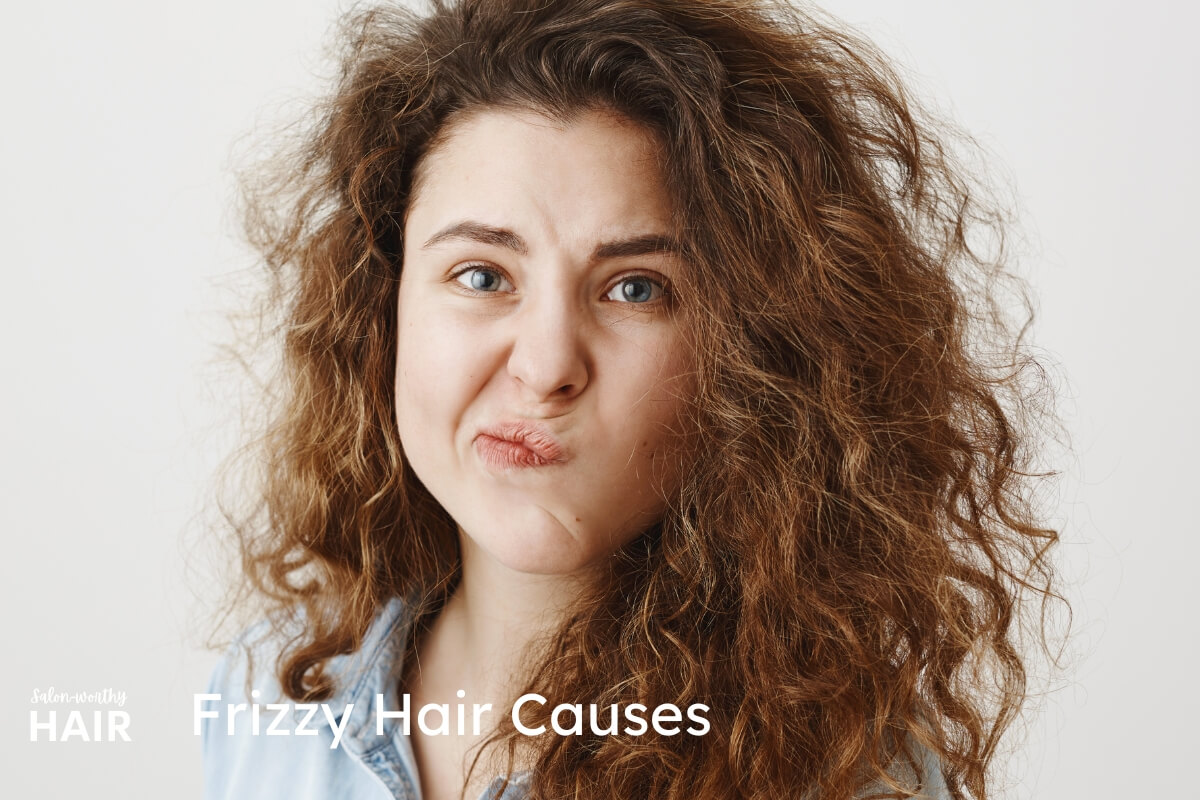
The main cause of frizzy hair is lack of moisture, prompting the cuticles on the hair strand to lift and absorb moisture from the surrounding air. The raised cuticles make the hair look fuzzy and disheveled as strands no longer lie sleek and flat.
While impromptu frizz may seem chaotic, its underlying causes extend beyond the lack of moisture and raised cuticles.
Frizzy hair can also result from the hair’s inherent texture, porosity, humidity, weather fluctuations, product buildup, hair care routine, hard water, over-processing, and biological factors like aging, and hormones.
So, what’s making your hair frizzy?
Let’s find out.
Here is a list of all the potential causes of frizzy hair:
Table of Contents
- Lack of Moisture
- Naturally Frizz-Prone Hair
- High Porosity Hair
- Humidity
- Weather
- Product Buildup
- Improper Washing, Drying, Brushing
- Hard Water
- Hair Damage
- Split Ends
- Hair Tools Are Too Old
- Static Charges
- Touching Hair Too Often
- Using Harsh Hair Products
- Aging
- Hormonal Fluctuations
- Medications
- Vitamin Deficiency
- New Hair Growths
- For Synthetic Wigs – (Lack of Care)
- How to Manage Frizzy Hair
- Causes of Frizzy Hair Summary
Lack of Moisture
Frizzy hair often lacks internal moisture and struggles to retain it. When hair is not adequately hydrated, the cuticle scales on the hair fibers lift and separate to absorb surrounding moisture. This lifting creates gaps between the cuticle scales and roughens the hair fiber surface. These gaps allow moisture to penetrate unevenly into the strand, causing swelling that separates individual hairs rather than keeping them bundled smoothly together.
As more cuticle scales stand apart, it creates a diffused, frizzy texture throughout the hair rather than defined, sleek strands lying flat against each other and the scalp.
While not every case of dry hair results in frizz, and not every case of frizz is due to dry hair, there is a significant correlation between frizz and dryness.
To moisturize dry and frizzy hair, use a deep conditioning treatment 2-3 times weekly. Apply it from mid-lengths to ends and let it sit for 20 minutes.
John Frieda Miraculous Recovery Deep Conditioner
Naturally Frizz-Prone Hair
Frizz-prone hair tends to become frizzy under specific conditions such as humidity, heat, and certain haircare practices. This propensity for frizz arises from hair that inherently has raised or open cuticles. Genetics can influence these traits and are commonly associated with curly, kinky, or fine hair types.
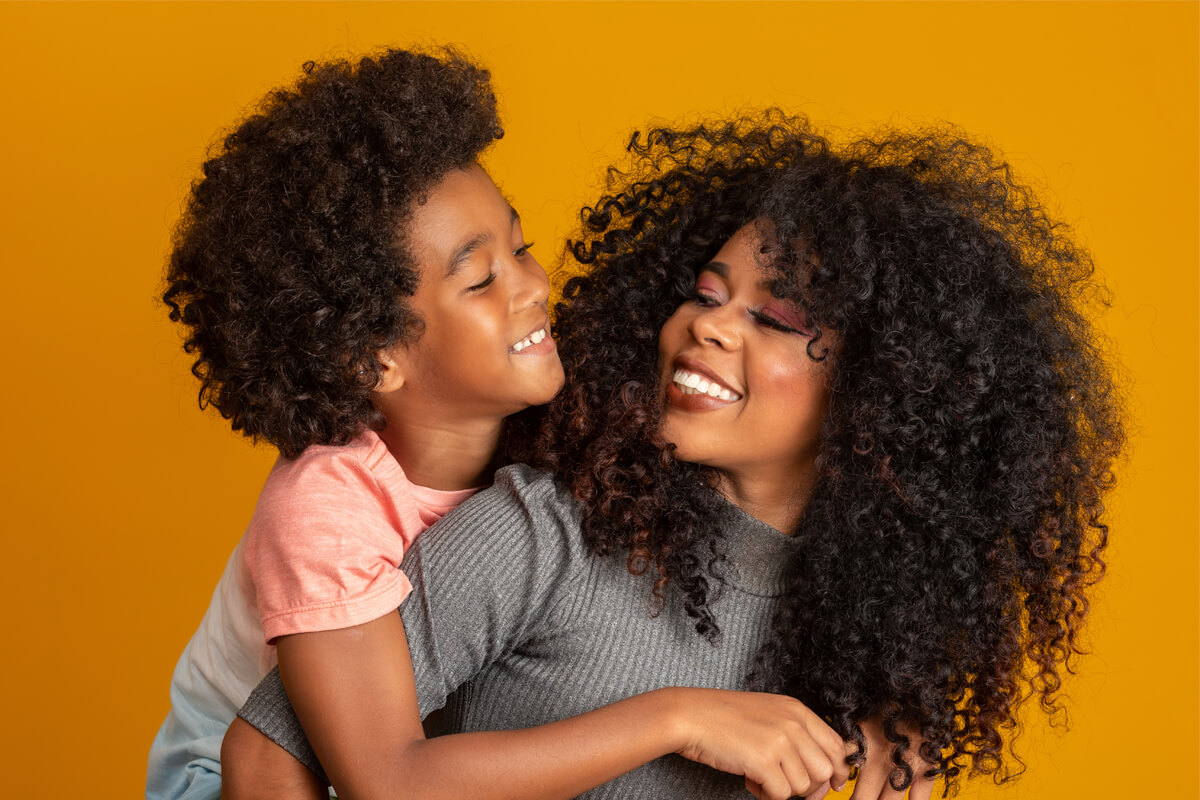
Read more: What hair types are prone to frizz?
A consistent hair care routine that includes moisturizing products and gentle handling is essential to effectively manage naturally frizzy hair.
High Porosity Hair
Hair with high porosity has cuticles that are more raised or even damaged. The raised cuticles absorb moisture quickly and lose moisture just as fast.
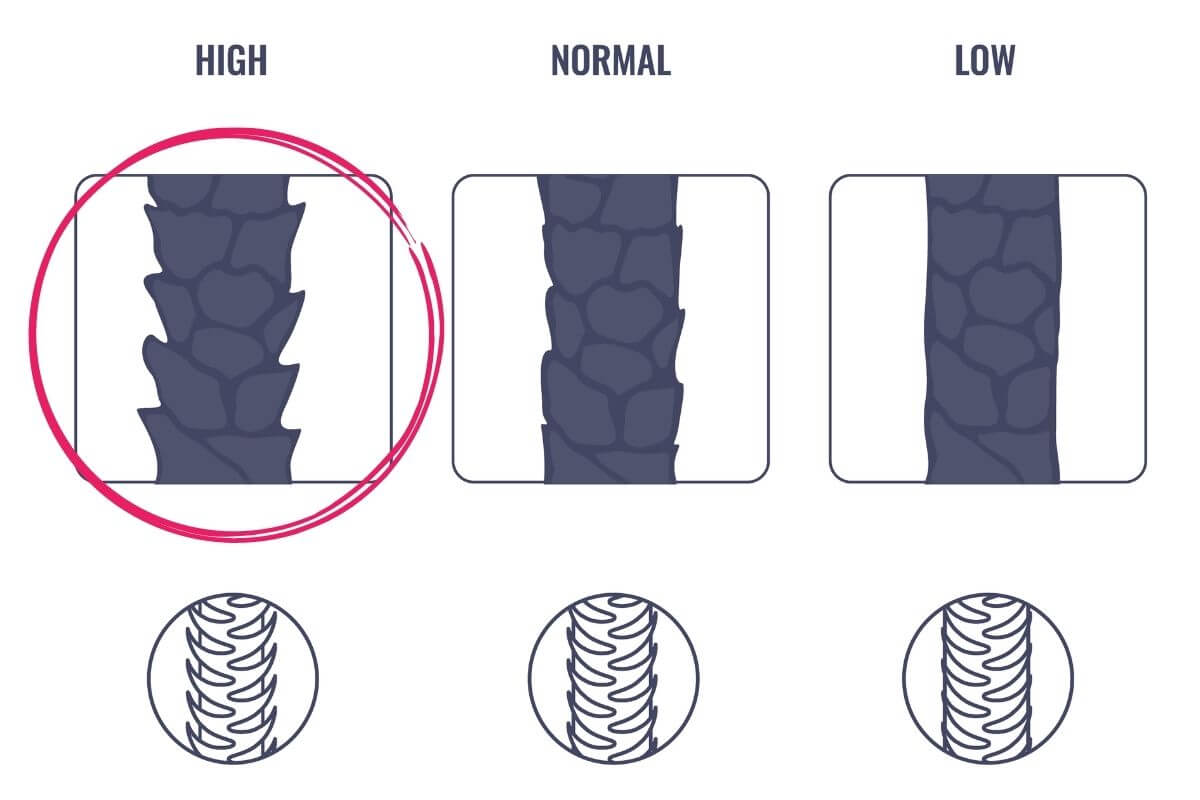
The quick absorption can lead to swelling of the hair strand, especially in humid conditions, resulting in frizz. The rapid loss of moisture, on the other hand, can leave the hair dry and prone to frizz.
When hair is highly porous, it’s more reactive to environmental moisture (like humidity), making it frizzy.
To manage high porosity hair and reduce frizz, use leave-in conditioners, sealants, and moisturizing hair products that help to lock in moisture and protect the hair shaft.
Humidity
In high humidity conditions, the air contains a higher amount of water vapor. Dry and highly porous hair will try to absorb this moisture in excess and swell. This swelling pushes the cuticle scales outward, making them more raised.

Adding to this dynamic, hair’s shape and style are largely determined by hydrogen bonds. These bonds can be disrupted by external moisture. Take, for example, someone with naturally curly hair who straightens it. The temporarily straightened hair’s longevity depends on the hydrogen bonds formed during styling. However, the excess moisture from humidity can break these bonds, prompting the hair to revert to its innate curly or wavy form.
The aftermath of these interactions — the protruding cuticle scales and the broken hydrogen bonds — manifests as frizz. Hair no longer lies flat and smooth. Instead, individual strands might curl, wave, or separate, giving hair that distinct rough and frizzy look.
To combat frizz in humidity, consider using an anti-frizz hairspray containing silicone. Silicone coats the hair, creating a protective barrier against moisture. However, while silicones can be effective for frizz control, it’s essential to occasionally use clarifying shampoos, as these products can build up over time and weigh the hair down.
Color WOW Dreamcoat Anti-Humidity Treatment
More: Tips to stop hair frizzing in humid weather
Weather
The weather is a major factor influencing the frizziness of your hair.
Cold spells can render hair brittle, making it more susceptible to breakage. On the flip side, the sweltering heat, particularly when paired with high humidity levels, can sap hair’s moisture, rendering it dry and frizzy. This effect is intensified under direct sunlight, degrading the hair’s protein structure and stripping away its natural oils, exacerbating the dryness and frizz.

However, it’s not just temperatures that play a role; windy conditions pose challenges. The gusts can entangle and rough up hair strands, causing them to rub against each other. This friction results in static, which further contributes to the frizzy appearance.
But there’s an underlying molecular factor beyond the direct effects of weather elements: hydrogen bonds. Responsible for maintaining hair’s shape, these bonds are exceptionally sensitive to moisture. These crucial bonds can be disrupted on rainy or humid days. So, if you’ve painstakingly straightened your hair, don’t be surprised if a humid day causes it to revert to its natural and possibly frizzier state.
While you can’t change the weather, you can prepare yourself to avoid getting caught out.
How?
Use this Frizz Forecast App that shows you the Frizz Index Factor based on daily weather forecasts.
Product Buildup
Hair products that are rich and heavy with waxes, oils, or silicones tend to accumulate on the hair shaft. This product buildup hinders the hair’s ability to absorb moisture. As a result, hair becomes dry and susceptible to frizz.
Moreover, as these hair products build up over time, they can weigh the hair down. The added weight challenges the natural formation of curls or waves, leading to a mix of limp and frizzy sections underneath the top layers.
The scalp isn’t immune to these effects either. A product-laden scalp may see a disruption in its natural oil production, fostering an environment where dryness prevails and a heightened tendency for frizz.
Use a clarifying shampoo once a week to remove product buildup and restore hair to its natural luster and bounce.
Improper Washing, Drying, Brushing
Washing hair with hot water, using shampoos containing sulfates, and not rinsing properly can disrupt the hair’s moisture balance and cuticle integrity, resulting in stringy and frizzy hair.
Improper Hair Washing Routine
Washing hair with extremely hot water can cause the protective cuticle scales of the hair strand to swell and lift, compromising the hair strand’s structure. This effect is exacerbated when sulfates in shampoos further strip the hair of its natural moisture and oils, vital for maintaining cuticle integrity. Overwashing amplifies this issue by constantly depleting the hair’s protective sebum, making it perpetually dry and susceptible to frizz.
Additionally, failure to rinse out shampoo and conditioner thoroughly results in product buildup, which not only dulls the hair but can also give it a fuzzy appearance.
Recommended: How to stop frizz after washing hair.
Rough Hair Drying
Post-shower hair-drying methods like vigorously rubbing wet hair with a regular towel, blow drying with high heat, or air drying in a humid bathroom can make hair look big and poofy.
When you vigorously rub your hair with a towel, you’re generating significant friction between the towel and the hair’s cuticle layer. This friction can cause the overlapping cells of the cuticle to lift or become ruffled. When these cells are not flat and smooth, they make the hair’s surface uneven. To prevent frizz from towel drying, use a microfiber towel and wrap it around your head like a turban. With its smooth texture and superior absorbency, a microfiber towel can draw out water from the hair without rubbing. It also reduces the time needed for drying and styling the hair, lessening the potential for frizz.
Recommended: How to air dry hair without frizz.
Improper Brushing Technique
Wet hair, being highly elastic, is vulnerable to breakage. Therefore, brushing it while damp can result in damage and ensuing frizz. For detangling post-shower hair, a wide-toothed comb is a better choice.
The type of brush matters, too; those with abrasive bristles can harm the hair cuticle, leading to both split ends and frizz over time. Lastly, moderation is key. Over-brushing not only creates static, giving hair that frizzy appearance, but also strips it of its protective natural oils, resulting in dryness.
Recommended: How to brush hair without creating frizz.
Hard Water
Hard water contains a high concentration of minerals like calcium, magnesium, and iron. Washing hair with hard water causes these minerals and irons to stick to the hair shaft.
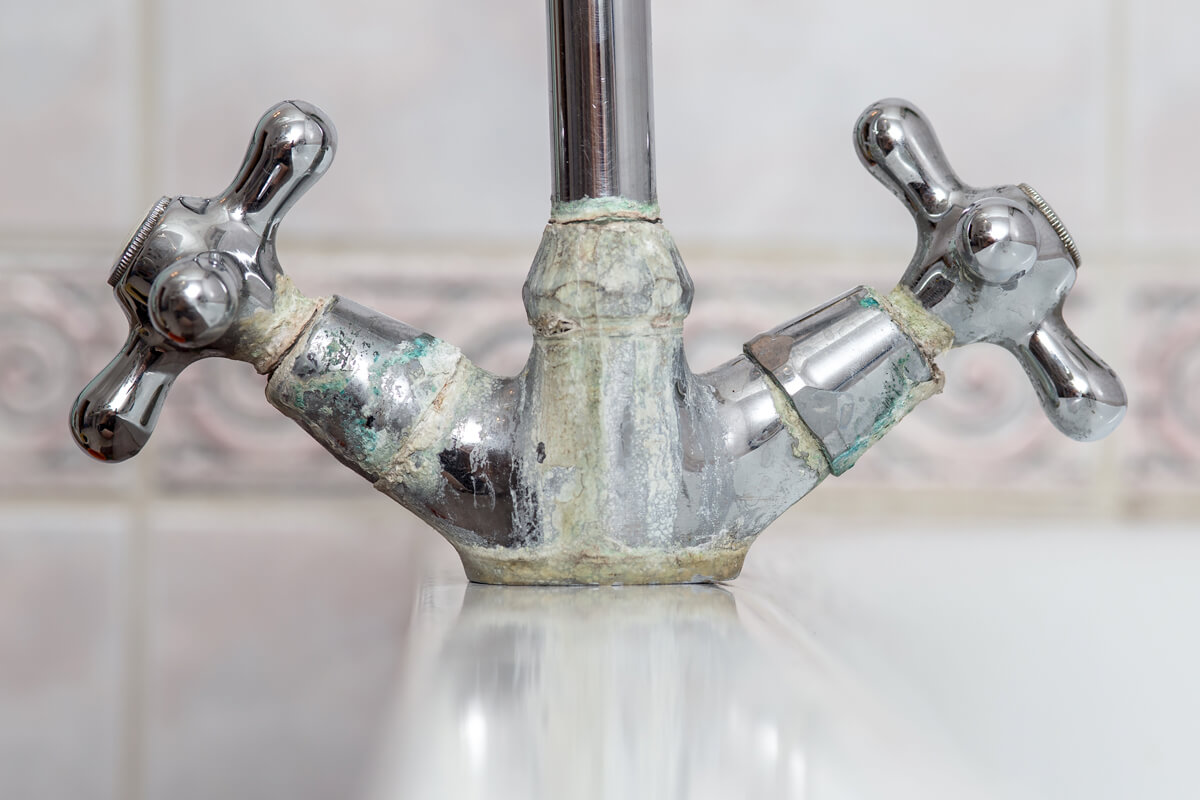
The problem with hard water is that it is not rinsable by regular shampoos. The minerals in hard water react with the detergents in shampoos to form a scum instead of producing a lather. Consequently, the scum coats the hair’s surface instead of rinsing out.
They can crystallize when hard water minerals build up on the hair shaft and are not rinsed out properly. This crystallized buildup roughens the surface of the hair cuticle, leading to frizz. It also prevents hydration from properly penetrating the hair shaft, making dry, brittle hair prone to frizz.
To mitigate hard water frizz, a hard water shampoo can be used periodically to remove mineral buildup. Additionally, installing a water softener provides an ongoing solution by removing the problematic minerals that react with shampoos and cause frizz-inducing buildup on hair.
Recommended: Best hard water shampoos.
Hair Damage
The cuticle layer becomes compromised when hair is damaged from excessive chemical processing or heat styling. The scales that make up the cuticle become fragmented and lift from the hair shaft. Raised cuticles make the hair more vulnerable to external factors like humidity, which can swell the hair strands and cause frizz.
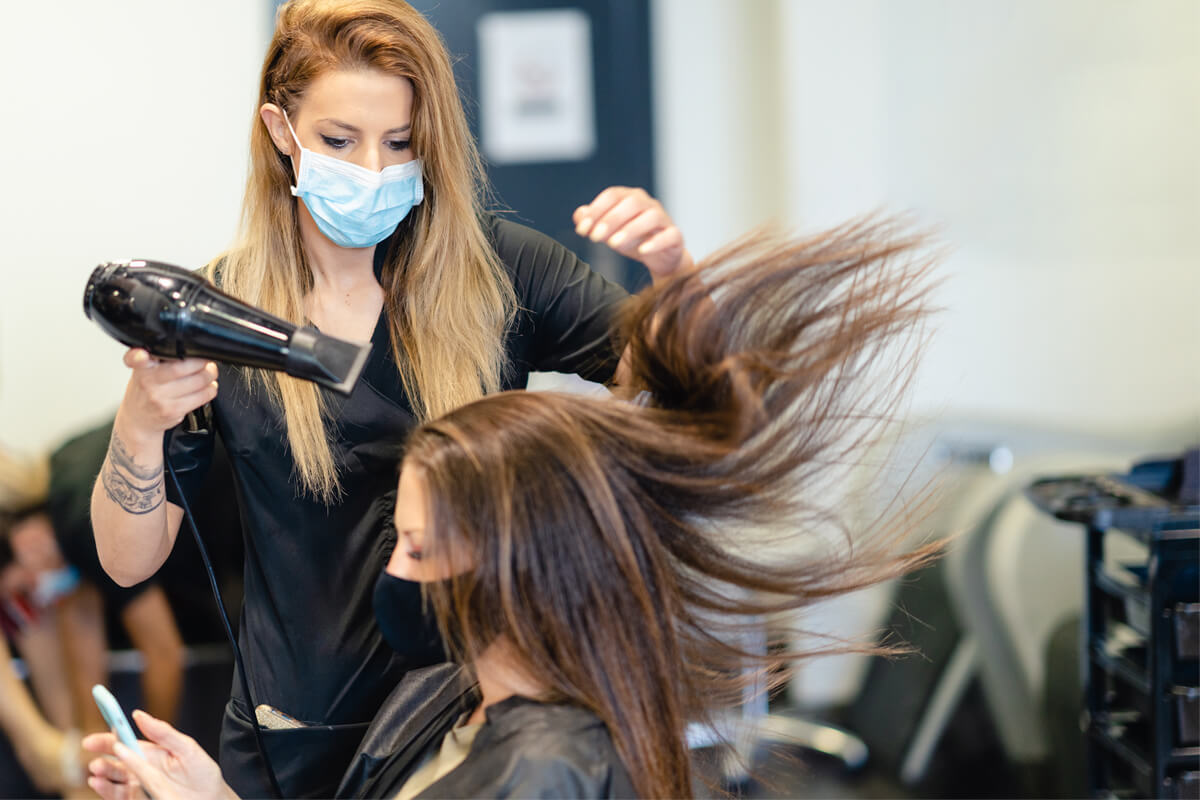
Additionally, a raised cuticle is unable to seal in moisture properly. The lack of inner moisture leads to chronic dryness and porosity issues within the hair cortex, causing the strands to absorb water unevenly from the air and frizz. A rough, lifted cuticle also lacks shine and smoothness since it cannot reflect light.
A healthy cuticle lays flat and acts as a barrier protecting the inner hair cortex of the hair. Once the cuticle is damaged, hair loses its natural defense against frizz-inducing factors. Repairing the cuticle through conditioning treatments and limiting the use of chemicals and hot tools can help protect against frizz over time.
Split Ends
Split ends, scientifically known as “trichoptilosis,” occur when the protective outer layer of the hair cuticle wears away from the innermost hair shaft. This degradation usually happens due to environmental stressors, excessive heat styling, chemical hair treatments, and mechanical damage (like rough brushing or combing).
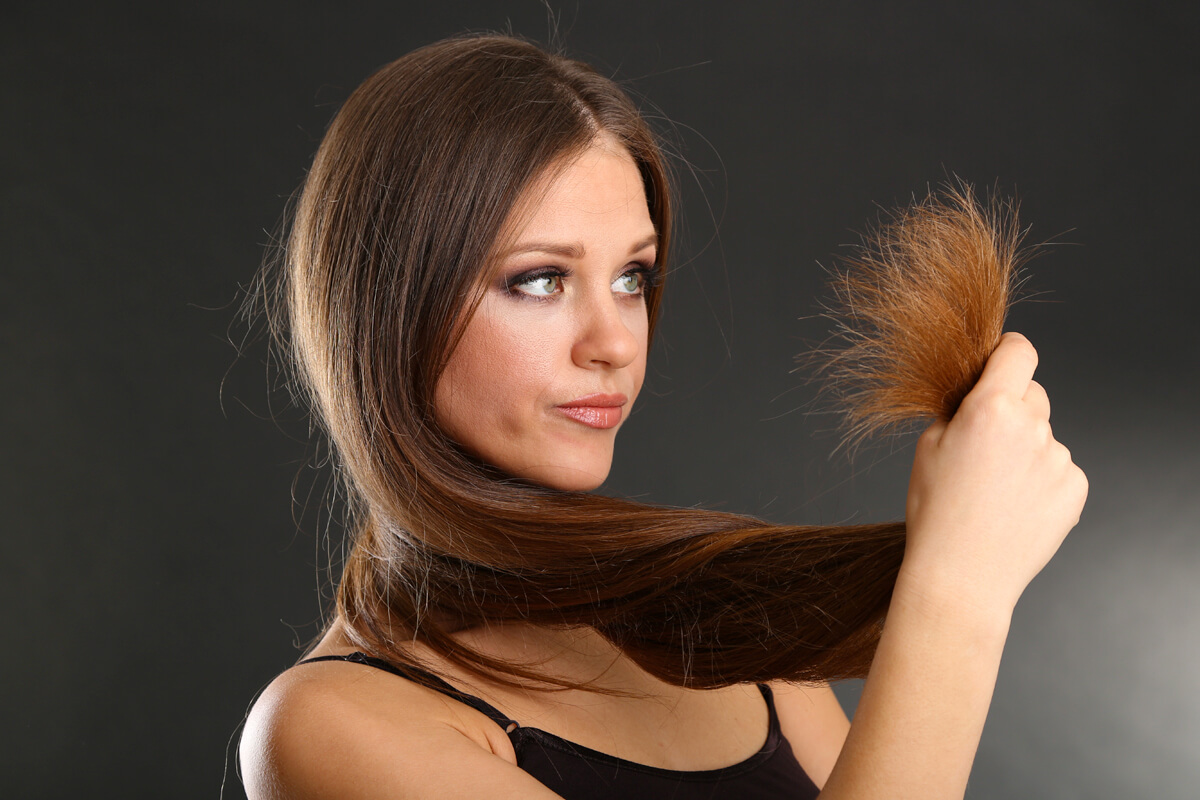
Once the cuticle is compromised, the hair shaft becomes vulnerable, splitting or fraying the hair’s ends into multiple fragments, much like the end of a frayed rope.
Frayed hair ends trigger tangles and knots with neighboring hairs. As they intertwine, they disrupt the unified arrangement of hair strands, creating a lack of natural cohesion in the hairstyle.
Split ends absorb and release moisture inconsistently, leading to periodic swelling and shrinkage of the hair strand, amplifying the frizzy appearance.
Split ends can also cause collateral damage. When they break, they often snag onto surrounding hairs, impairing the cuticle alignment of those innocent bystanders. The ripple effect of this cuticle misalignment further fuels frizz. To make matters worse, the knotted mess they often create necessitates forceful brushing and detangling. This aggressive treatment only intensifies cuticle disruption, leading to even more frizz.
Hair Tools Are Too Old
Old hair tools can cause frizzy hair due to having worn-out protective coatings, rough edges, degraded heating elements, and accumulated product residue.
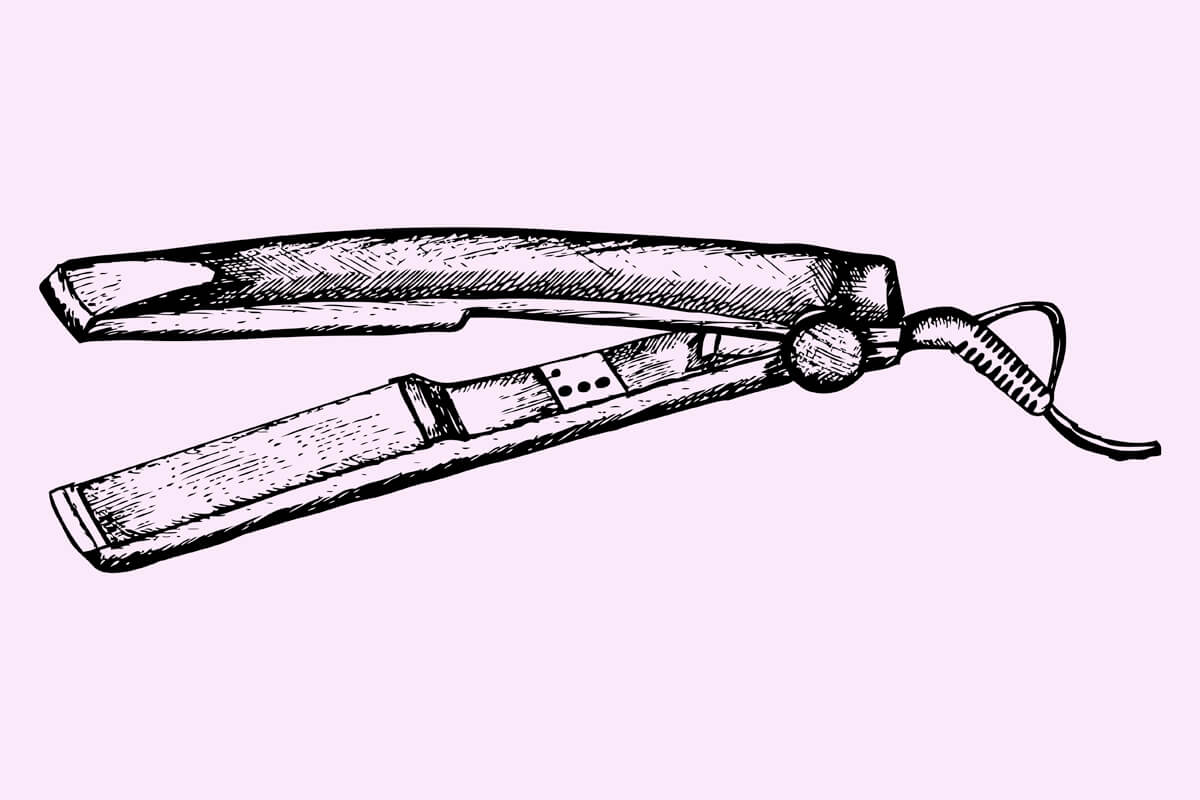
If your hair straightener is too old, it may not run smooth enough through your hair because its protective coatings may have worn off with wear and tear. The lack of protective coatings rough surfaces and edges, which can snag the hair every time you use it. Hair styling tools like hair straighteners and hair dryers can also become inconsistent with their heat distribution. The fluctuating temperatures can disrupt the hair’s moisture balance and cause frizz.
Mechanical wear and tear is also a concern. Brushes and combs, especially older ones, might have broken or bent bristles, acting more as hair adversaries than allies. Such imperfections can catch on hair, leading to breakage, split ends, and the all-too-familiar frizz.
Static Charges
Static charge makes hair look “staticky” or frizzy. Individual hair strands repel each other due to the similar charges they carry, causing the hair to stand on end or puff out. This results in hair that appears wild, unmanageable, and flyaway rather than lying smooth and flat.
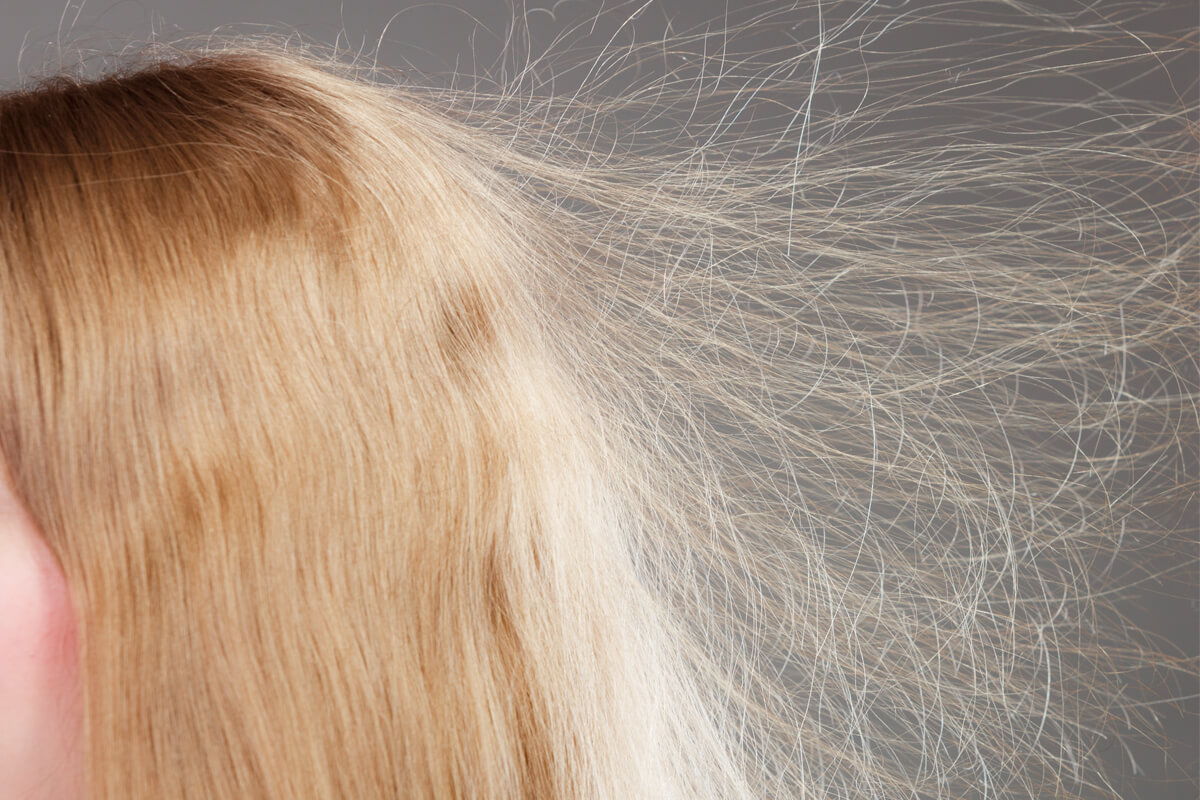
An imbalance of electrons causes static electricity in hair. The balance of electrons on the hair can be disrupted by dry weather conditions or everyday actions like brushing or rubbing the hair.
During the colder winter, the air tends to be drier with reduced humidity. This environment can lead to hair losing moisture and electrons, increasing its susceptibility to static charge.
Everyday actions like brushing or rubbing the hair, especially when involving synthetic materials, contribute to static and frizz. Friction prompts electrons to shift away from the hair, culminating in a buildup of a positive charge. When these strands acquire a positive charge, they naturally repel each other, akin to the push between two like-charged magnets. The repelling causes the hair to separate and adopt a frizzy, “staticky” appearance.
Use an anti-static hairspray to fix static charges in hair.
Touching Hair Too Often
Frequently touching your hair can cause frizz by transferring moisture and oils from your fingers and hands onto your hair. Touching hair too often also causes physical agitation.
Our fingers and palms are naturally endowed with oils. While essential for maintaining skin moisture, these oils aren’t necessarily beneficial when transferred onto our hair in excess. When we touch our hair, these oils move from our fingers to our strands, causing a moisture imbalance in the hair.
Besides the transfer of oils, there’s another subtle yet significant effect of frequent touching: physical agitation. We subject the hair to physical stress whenever we run our fingers through our hair or twirl a strand around a finger. Frequently touching the hair can disturb its natural pattern, leading to misalignment of the hair cuticles, a precursor for frizz.
Using Harsh Hair Products
Harsh hair products, including alcohol and sulfates-based, can strip hair’s natural oils, leading to dryness and frizz. Alcohol dries out hair, while sulfates can be too aggressive in cleansing, contributing to frizz.
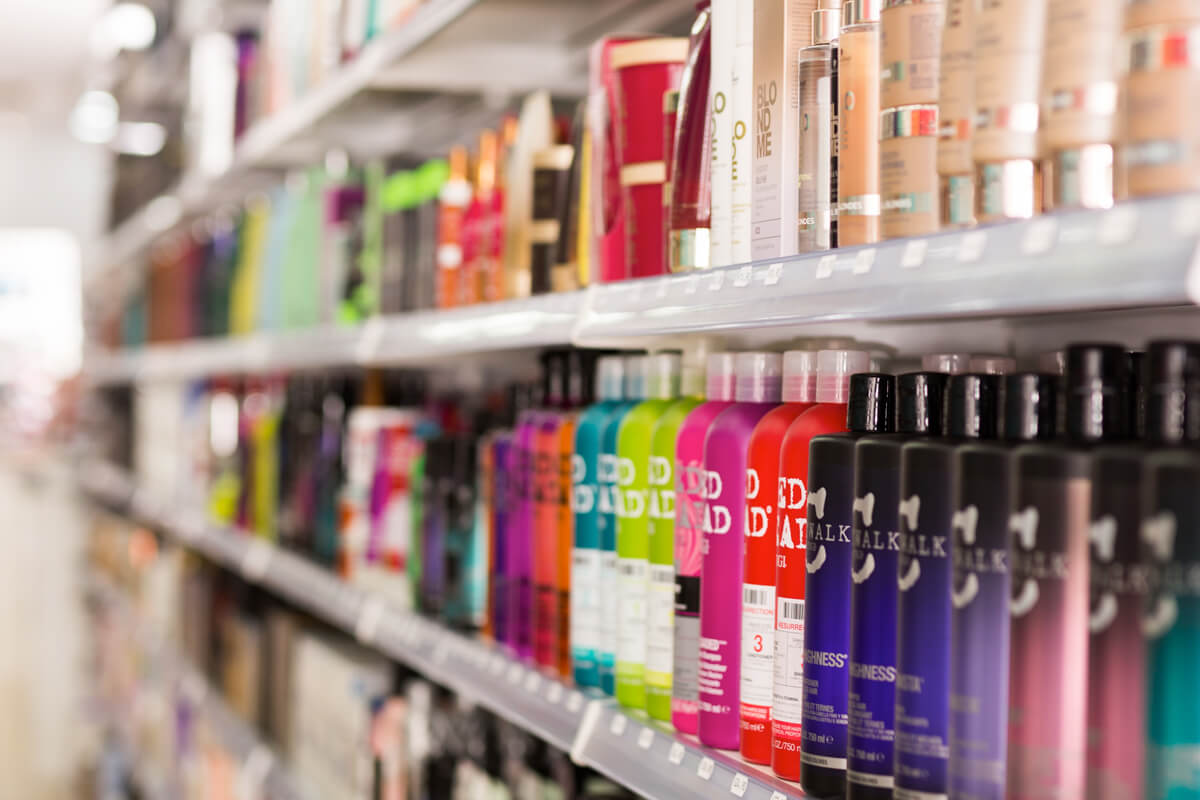
Many products like hairsprays, mousses, and gels may contain a high concentration of alcohol, usually ethanol. Alcohol molecules have a lower boiling point and vapor pressure than water or oil. This characteristic makes alcohol inherently volatile and energetic. The molecules easily break free from liquid form and evaporate quickly in gas.
When applied to the hair, the rapid evaporation of alcohol in hair products can suddenly make your hair dry and frizzy.
Sulfates are surfactants that contain a hydrophilic head and hydrophobic tail. This structure allows them to break up and remove oils and dirt. However, they also disrupt the hair’s cuticle layer and remove essential oils that keep hair smooth. Sulfates reduce surface tension and allow water to penetrate deeper into the hair shaft.
Sulfates also break down and denature keratin proteins present in hair through a process called protein denaturation. Keratin gives hair its strength and structure. By breaking the salt bridges and hydrogen bonds that hold keratin proteins together in their folded shape, sulfates cause hair proteins to unfold and lose their structural integrity. Unfolded, damaged keratin proteins cause the hair cuticle to become rough and lift, increasing friction, tangling, and frizz.
Be cautious when choosing your hair products. Always opt for alcohol-free and sulfate-free products.
Aging
Frizz can result from multiple factors exacerbated by the aging process.
Aging is a natural biological process impacting every cell. Our sebaceous glands’ activity diminishes as we age, resulting in decreased sebum production. This reduction in sebum causes our hair to become drier. Drier hair is inherently more prone to frizz due to its tendency to absorb external moisture.

Another impact of aging is on the hair cuticles, which become rough and irregular. These roughened cuticles don’t lie flat, making the hair susceptible to frizz.
Aging depletes melanin production, turning hair gray. Gray hair usually has a different texture, often more frizz-prone than its pigmented counterpart. Over the years, hair endures environmental damage from the sun, pollutants, and chemicals, weakening it further. Consequently, this weakened hair loses its resilience and moisture, making it even more susceptible to frizz.
Hormonal Fluctuations
Hormonal fluctuations induce changes in the body’s hormone levels. Sebum production is critical to these fluctuations, as hormones, notably androgens, regulate it.
With imbalanced hormone levels, the scalp may produce too much or too little sebum, the natural oil that maintains the hair’s moisture balance.
When this balance is disrupted due to altered sebum production, the result is drier hair. Beyond just moisture, hormonal imbalances can also compromise hair’s elasticity, rendering it brittle.
Brittle hair, lacking elasticity, becomes prone to breakage, often manifesting as frizz. Additionally, hormonal shifts, such as those experienced during pregnancy or menopause, can change hair texture. This altered texture further predisposes hair to frizziness.
In essence, frizzy hair is often the byproduct of hormonal changes, including moisture imbalance, diminished elasticity, and texture alterations, all stemming from hormonal fluctuations.
More: How to embrace menopausal frizz.
Medications
Medications are substances that diagnose, treat, prevent, or cure diseases and alleviate medical symptoms. Medications responsible for their therapeutic effects can sometimes affect the body’s physiological processes.

Certain medications can trigger scalp dryness or disruption of the hair growth cycle, causing medication-induced frizzy hair.
Diuretics: These medications used to treat high blood pressure, heart failure, and other conditions increase urine output. Diuretics lead to dehydration and electrolyte imbalances, which can dry out the hair and make it frizzy. Anti-inflammatories: Drugs like corticosteroids reduce inflammation in the body but may also suppress natural oils in the scalp, disrupting the hair’s moisture balance. Hormonal medications: Medications that affect hormone levels, like oral contraceptives and thyroid drugs, can influence sebum production. Changes in oil balance on the scalp can lead to frizzy, unmanageable hair. Beta-blockers: This medication used for heart conditions can cause dry skin and hair as a side effect. Lack of moisture causes frizz and flyaways.Consulting a doctor or pharmacist about the potential side effects of your medications can help manage medication-induced frizzy hair. Adjusting hair care routines to add more hydration may also help combat frizz.
Vitamin Deficiency
Insufficient intake or absorption of essential vitamins directly impacts scalp health. Vitamins are micronutrients that the body must obtain from diet or supplements to support various physiological processes necessary for the body’s growth, maintenance, and health.
Certain vitamins, such as biotin, are integral to hair growth and strength. A deficiency in these vital nutrients can hinder growth and render the hair strands weak. This weakened state, consequent to vitamin inadequacy, makes the hair brittle and more susceptible to breakage, leading to uneven lengths and textures. Furthermore, vitamins are crucial for maintaining a hair’s smooth texture. Their deficiency can disrupt the hair’s cuticle health, resulting in rougher hair.
A healthy cuticle lies flat, but vitamin-starved cuticles tend to lift. These raised cuticles expose hair to external damage and facilitate moisture loss. As a result, frizzy hair often emerges as a manifestation of this chain of events, driven by the initial vitamin deficiency.
New Hair Growths
New hair growths are strands freshly emerging from the scalp. These new growths typically have a shorter length than the rest of the hair, resulting in a disparity in hair length. This unevenness extends to texture as well.
New hairs can feel softer or more delicate than the mature ones. With the addition of these new strands, there’s an increase in volume near the scalp, altering the way surrounding hair settles.
Additionally, these new strands might not always follow the direction of longer, established hairs, causing them to jut out. Due to their proximity to the scalp, new growths often have less exposure to external damaging elements, ensuring their health but creating a contrasting texture with older hair. This mix of varying lengths and textures complicates the styling process, heightening the risk of frizz.
Moreover, the cuticles of the new hair might not be as well-aligned or flattened as those of mature strands, adding to the frizz. The culmination of these disparities creates an uneven hair surface, manifesting as noticeable frizziness. Thus, frizzy hair can result from the differences between newly sprouted hair and mature hair’s length, textures, direction, and cuticle alignment.
For Synthetic Wigs – (Lack of Care)
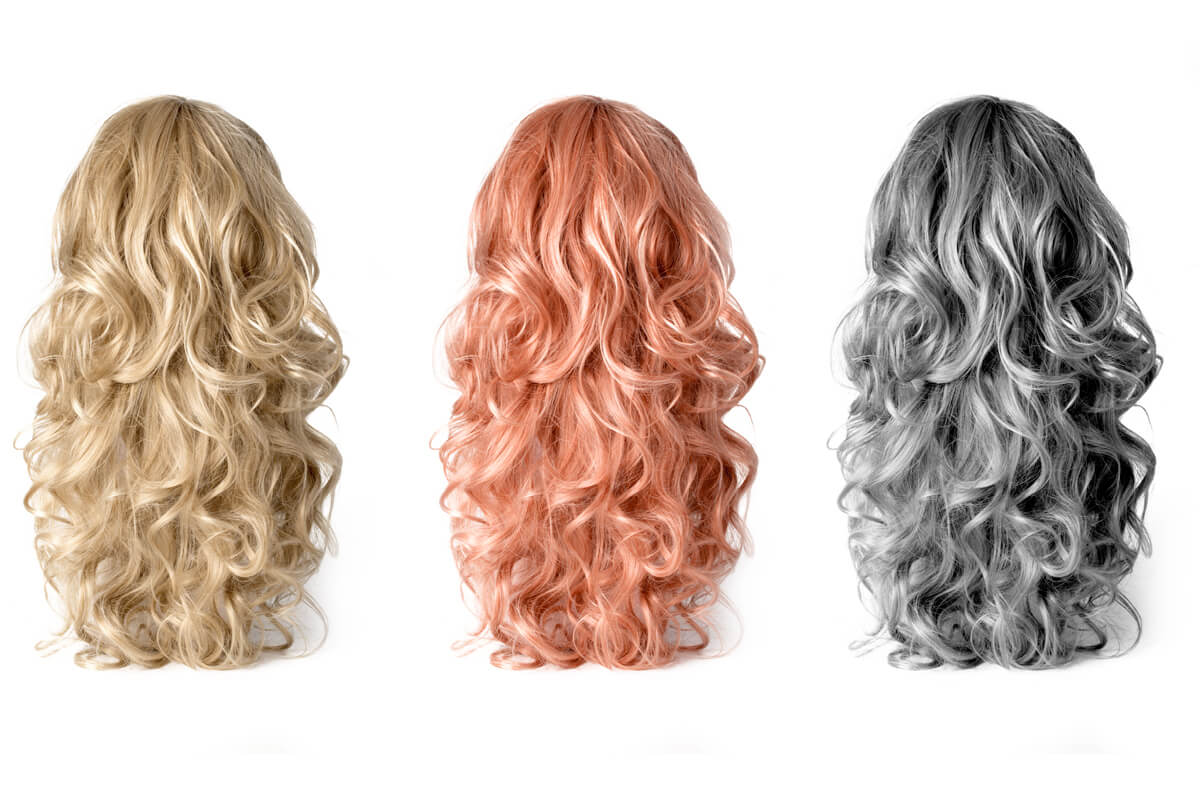
For many of us, frizzy wigs are a pain because they can look unkempt, dull, and even dirty. As a result, we feel less confident and less comfortable when styling our wigs.
Over time, it’s common for synthetic wigs to adopt some frizz. That’s because wigs are made from artificial fibers, losing their shape and producing static electricity (or static cling).
Use a shampoo for synthetic wigs that can remove dirt and buildup, like the SheaMoisure shampoo for synthetic and natural hair.
Use a wide-tooth comb to brush them regularly and keep them clean.
How to Manage Frizzy Hair
To effectively manage frizzy hair, you must assess your hair and its underlying condition like texture, porosity, and damage.
It may be that your hair is naturally prone to frizz due to its curly, kinky, or fine texture. Or your hair may be damaged and has high porosity, causing excess moisture absorption to swell the disrupt its cuticle layer.
By understanding the root cause, a hair care routine can be developed to cater to your hair’s specific needs. You may need to consult a hairdresser for a professional smoothing treatment or change your hair products.
To find out more, check our guide:
How to manage frizzy hair – The complete guide.
Causes of Frizzy Hair Summary
Frizzy hair is primarily caused by a lack of moisture in the hair shaft and cuticles lifting to absorb moisture. This moisture deficiency stems from high porosity, dry weather, hard water minerals, product buildup, damage from heat styling, split ends, and aging.
Frizz-prone hair types like curly and fine hair are more vulnerable to these moisture-sapping elements. External factors such as humidity and static electricity from rubbing and brushing also disrupt cuticle alignment.
Improper hair care habits like harsh washing, rough drying, and over-brushing further damage cuticles. Frequently touching hair or using products with sulfates and alcohol strip protective oils. Fluctuating hormones and certain medications alter oil production, influencing frizz.
Vitamin deficiencies make hair brittle, while new growth creates uneven lengths compared to mature strands. The result is roughness and lack of cohesion, causing frizz.
To summarize, frizz is a manifestation of moisture imbalance caused by weather, genetics, hair care practices, health, and hormonal factors. Maintaining proper care and styling habits can help tame frizz.
About the Author
 Shehnaz Shirazi
Shehnaz ShiraziShehnaz Shirazi has been writing in the beauty and cosmetics industry for over 8 years, sharing her expansive hair care and beauty knowledge. Shehnaz researches and tests new hair care trends and publishes her insights here.

